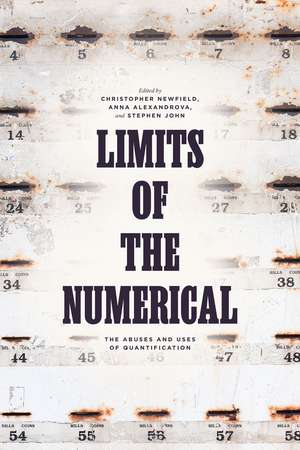Limits of the Numerical: The Abuses and Uses of Quantification
Editat de Dr. Christopher Newfield, Dr. Anna Alexandrova, Dr. Stephen Johnen Limba Engleză Paperback – 24 iun 2022
Numbers are both controlling and fragile. They drive public policy, figuring into everything from college rankings to vaccine efficacy rates. At the same time, they are frequent objects of obfuscation, manipulation, or outright denial. This timely collection by a diverse group of humanists and social scientists challenges undue reverence or skepticism toward quantification and offers new ideas about how to harmonize quantitative with qualitative forms of knowledge.
Limits of the Numerical focuses on quantification in several contexts: climate change; university teaching and research; and health, medicine, and well-being more broadly. This volume shows the many ways that qualitative and quantitative approaches can productively interact—how the limits of the numerical can be overcome through equitable partnerships with historical, institutional, and philosophical analysis. The authors show that we can use numbers to hold the powerful to account, but only when those numbers are themselves democratically accountable.
| Toate formatele și edițiile | Preț | Express |
|---|---|---|
| Paperback (1) | 227.23 lei 6-8 săpt. | |
| University of Chicago Press – 24 iun 2022 | 227.23 lei 6-8 săpt. | |
| Hardback (1) | 538.00 lei 3-5 săpt. | +27.61 lei 4-10 zile |
| University of Chicago Press – 13 iul 2022 | 538.00 lei 3-5 săpt. | +27.61 lei 4-10 zile |
Preț: 227.23 lei
Nou
Puncte Express: 341
Preț estimativ în valută:
43.49€ • 44.92$ • 36.19£
43.49€ • 44.92$ • 36.19£
Carte tipărită la comandă
Livrare economică 25 martie-08 aprilie
Preluare comenzi: 021 569.72.76
Specificații
ISBN-13: 9780226817156
ISBN-10: 0226817156
Pagini: 304
Ilustrații: 2 halftones, 5 tables
Dimensiuni: 152 x 229 x 18 mm
Greutate: 0.4 kg
Ediția:First Edition
Editura: University of Chicago Press
Colecția University of Chicago Press
ISBN-10: 0226817156
Pagini: 304
Ilustrații: 2 halftones, 5 tables
Dimensiuni: 152 x 229 x 18 mm
Greutate: 0.4 kg
Ediția:First Edition
Editura: University of Chicago Press
Colecția University of Chicago Press
Notă biografică
Christopher Newfield is director of research at the Independent Social Research Foundation, London. Anna Alexandrova is professor of philosophy of science in the Department of History and Philosophy of Science at the University of Cambridge, where she is also a fellow of King’s College. Stephen John is the Hatton Lecturer in the Philosophy of Public Health in the Department of History and Philosophy of Science at the University of Cambridge, where he is also a fellow of Pembroke College.
Cuprins
List of Figures, Tables, and Box
Introduction: The Changing Fates of the Numerical
Christopher Newfield, Anna Alexandrova, and Stephen John
Part I
Expert Sources of the Revolt against Experts
1. Numbers without Experts: The Populist Politics of Quantification
Elizabeth Chatterjee
2. The Role of the Numerical in the Decline of Expertise
Christopher Newfield
Part II
Can Narrative Fix Numbers?
3. Audit Narratives: Making Higher Education Manageable in Learning Assessment Discourse
Heather Steffen
4. The Limits of “The Limits of the Numerical”: Rare Diseases and the Seductions of Qualification
Trenholme Junghans
5. Reading Numbers: Literature, Case Histories, and Quantitative Analysis
Laura Mandell
Part III
When Bad Numbers Have Good Social Effects
6. Why Five Fruit and Veg a Day? Communicating, Deceiving, and Manipulating with Numbers
Stephen John
7. Are Numbers Really as Bad as They Seem? A Political-Philosophy Perspective
Gabriele Badano
Part IV
The Uses of the Numerical for Qualitative Ends
8. When Well-Being Becomes a Number
Anna Alexandrova and Ramandeep Singh
9. Aligning Social Goals and Scientific Numbers: An Ethical-Epistemic Analysis of Extreme Weather Attribution
Greg Lusk
10. The Purposes and Provisioning of Higher Education: Can Economics and Humanities Perspectives Be Reconciled?
Aashish Mehta and Christopher Newfield
Acknowledgments
References
Contributors
Index
Introduction: The Changing Fates of the Numerical
Christopher Newfield, Anna Alexandrova, and Stephen John
Part I
Expert Sources of the Revolt against Experts
1. Numbers without Experts: The Populist Politics of Quantification
Elizabeth Chatterjee
2. The Role of the Numerical in the Decline of Expertise
Christopher Newfield
Part II
Can Narrative Fix Numbers?
3. Audit Narratives: Making Higher Education Manageable in Learning Assessment Discourse
Heather Steffen
4. The Limits of “The Limits of the Numerical”: Rare Diseases and the Seductions of Qualification
Trenholme Junghans
5. Reading Numbers: Literature, Case Histories, and Quantitative Analysis
Laura Mandell
Part III
When Bad Numbers Have Good Social Effects
6. Why Five Fruit and Veg a Day? Communicating, Deceiving, and Manipulating with Numbers
Stephen John
7. Are Numbers Really as Bad as They Seem? A Political-Philosophy Perspective
Gabriele Badano
Part IV
The Uses of the Numerical for Qualitative Ends
8. When Well-Being Becomes a Number
Anna Alexandrova and Ramandeep Singh
9. Aligning Social Goals and Scientific Numbers: An Ethical-Epistemic Analysis of Extreme Weather Attribution
Greg Lusk
10. The Purposes and Provisioning of Higher Education: Can Economics and Humanities Perspectives Be Reconciled?
Aashish Mehta and Christopher Newfield
Acknowledgments
References
Contributors
Index
Recenzii
“Limits of the Numerical shows with compelling detail, theoretical vision, and political urgency just how and why numbers matter. As J. L. Austin and Judith Butler showed us how we do things with words, the authors of Limits of the Numerical show us how we do things with numbers.”
“The availability and power of numbers in our ‘data-driven world’ have never been greater, and, for just that reason, are greatly contested. Limits of the Numerical explores the paradoxes of quantitative reasoning that have arisen as a corollary of its power and recognizes that a blind reverence for numbers undermines expertise as much as it supports it. These stories of numbers are inescapably human ones.”
“In the confusing context of both the pandemic and global warming, this compelling book is a timely unraveling of the uses and abuses of statistical models, quantified measures, big data, and numerical targets. Limits of the Numerical paves the way for renewed scientific controversies and public debates on the work of quantification and its politics.”
